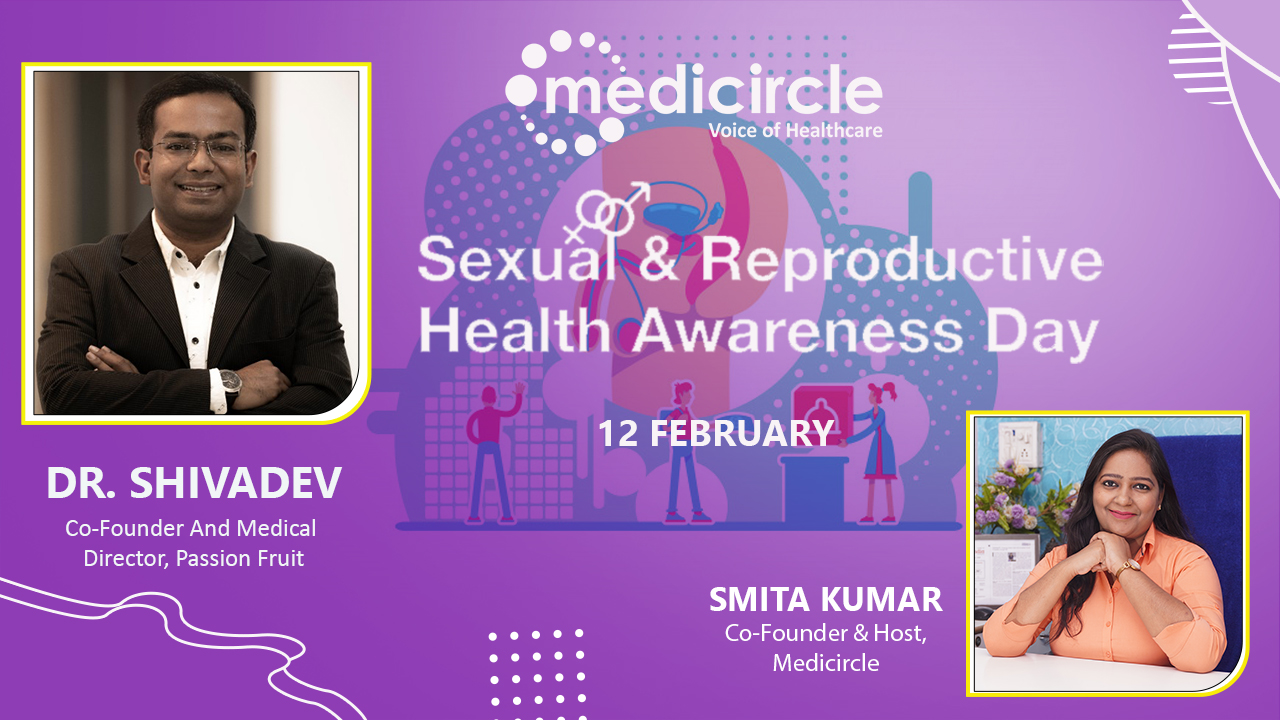Sexual and reproductive health is a subject that is not much appreciated for an open discussion in our country. Sexually transmitted infections continue to be one of the major public health care concerns. Medicircle is conducting a series on sexual and reproductive health to raise awareness about the issues related to it, and to educate society to reduce the spread of sexually transmitted infections and thus the diseases.
Dr. Shivadev M is Co-founder and Medical Director at Passion Fruit. He is a Psychiatrist and Sexual Wellness Expert based in Bangalore with 14years of experience in the field. He works closely with patients, understands them as people first, and then works with them to help overcome their sexual and relationship problems.
Passion Fruit is a center of excellence for Sexual Medicine. It’s a world-class clinic with a state-of-the-art process to take care of all relationship and sexual wellness needs. It strives to provide a comprehensive and complete fruitful solution to the problems one may be suffering from by empathetically understanding the sensitivities and complexities involved.
“Sexual” and “Reproduction” are separate yet interconnected factors
Dr. Shivadev explains “ "sexual” and “reproduction” can appear separate from each other but they are interconnected factors in many ways. Awareness about this would help individuals to take care of both their sexual and reproductive health. People should be aware of their bodies, they should be aware of their anatomies and the issues that their bodies face. Basic knowledge about one’s body would make sexual activities better, thereby leading to safer reproduction."
People don’t communicate due to shame, guilt, stigma, and taboo
Dr. Shivadev points out, “there's a lot of shame, there's a lot of guilt, there's a lot of stigma and taboo so people find it difficult to communicate about their sexual issues. We need to encourage open communication. There should be healthy communication with the youngster about the safety aspects of having sexual intimacy, if at all because if we do not do so, they are going to try things without much knowledge or might get exploited. We can make it easy for them by making them understand the various contraceptive methods to prevent sexually transmitted infections and the consequences that they could lead to."
Basic Awareness about One’s Sexual and Reproductive Well-Being is Missing
Dr. Shivadev is of the opinin that people do not have enough knowledge about the significance of their overall health and its impact on their reproductive health e.g.: they should know that issues like anaemia, thyroid disorders, hormonal imbalance, etc. can affect reproductive health, cervical health, and uterus. Women should know about diets and other measures to ensure good reproductive health. They should be made aware that physical and mental well-being will add to their sexual and reproductive well-being.
Sex Education should be Normalized
Dr. Sivadev emphasizes, "Sex education is the least discussed topic and certainly not a dinner table conversation. A lot of people find it very difficult to express or seek advice in their sexual matters. Sex education has not been normalized in India yet. I wish and hope that it is going to be a norm for us because the right information can direct us in the right way so that we don't have any shame and we can adequately understand these things.”
Dependency on the Internet can lead to Misinterpretation of Information
Dr. Shivadev cautions, "Today, anybody can go on the internet can make a video and upload it on YouTube channel, get subscribers. But if people are consuming the wrong information, they are getting anxious and worried due to misinterpretation of the medical information. As it is a lot of myths are in circulation about sexuality, and on top of that, people consume internet knowledge and don’t talk about it. All this is damaging. So, the right information and communication would make a very big change in people's perspectives and attitudes towards sexual and reproductive health. If you look at the households, the social-cultural aspects of upbringing, and how sex has been spoken about, it has been made to feel that it’s a wrong thing to talk about. We have to change how people perceive these things," Dr. Shivadev says.
Need to Normalize the Conversation about Sexual Health
Dr. Shivadev points out, "We should start discussions about sexual and reproductive issues with both genders. For e.g., we should discuss menstrual cups, menstrual cycles, various aspects of sanitary napkins, and make it easier for women to accept that it's a natural thing that they go through instead of being ashamed of discussing it. Unless they start to know about themselves, they would have low confidence. This psychological impact makes it difficult to connect with their partners."
Knowledge helps Partners to Connect Better
Dr. Shivadev informs, "There are a lot of consequences if sex is not enjoyed or is not normalized in the relationship. It can have a lot of negative consequences starting with relationships. Also, people are not aware of the various physical aspects of the sex like orgasms can do a lot of things for them, and mood changes can also happen. So psychological well-being also is compromised. People don't discuss these things with their kids as well. So, it just continues resulting in sexual anxiety as the kids grow up. So, there are physical consequences, psychological consequences, and relationship consequences if there is lack of knowledge."

STDs are the Cause of Low Awareness
"When people are less aware, they may not even be going for a check-ups. STDs, Genital infections are not given importance, routine checks are not done. That's why it's really important to make people aware from a larger perspective,"says Dr. Shivadev.
Unprotected sexual intercourse can lead to silent infections
Dr. Shivadev is of the opinion, "When people have multiple sexual partners, unprotected sexual intercourse can have silent infections, which can affect the fallopian tubes, uterus, etc, of women leading to infertility at a later stage. So, if one sees this as a spectrum, there needs to be a proper understanding. If all these things are discussed, we can prevent a lot of things, we have to be on the preventive stage rather than experiencing it as a common disease later on. If we have policies right across these things, it would be very helpful."
Lots Have been done, lots need to be done
Dr. Shivadev explains, "Is it okay for me to go and talk? Or does it make me a different person? Or Is it going to be curable? Is it going to be treatable? Or do I live with this? - These kinds of attitudes are some of the challenges that we face. Not everywhere, there is access to medical information for e.g. in remote villages. Even primary health set-ups are missing in those places. Not having the right nutrition does not lead to a good hormonal system, and then that can affect the sexual reproductive health, it can make people weak, can make them tired, and can have consequences on sexual dysfunction.
But I think a lot has been done in this regard. Government policies are coming in, which are focusing on women’s and children's health, and maternal health. I think even social messages are helpful. There are a lot of movies and documentaries being made. I think sexual and reproductive health is going through a lot of evolution. Even though its not a revolution, at least things are evolving," says, Dr. Shivadev.
(Edited by Amrita Priya)

 Dr. Shivadev M, Psychiatrist, and Sexual Wellness Expert, puts forward action points to ensure correct knowledge and corrective measures in the arena of sexual and reproductive health.
Dr. Shivadev M, Psychiatrist, and Sexual Wellness Expert, puts forward action points to ensure correct knowledge and corrective measures in the arena of sexual and reproductive health.







.jpeg)



.jpg)








.jpeg)





.jpg)




.png)



